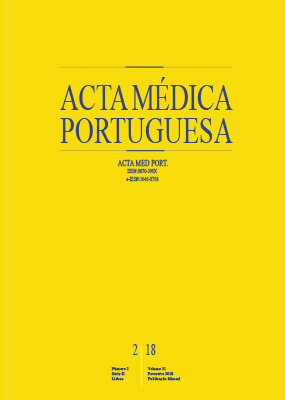Alzheimer’s Disease Assessment Scale - Cognitive Subscale (ADAS-Cog): Normative Data for the Portuguese Population
DOI:
https://doi.org/10.20344/amp.8859Keywords:
Alzheimer Disease, Cognitive Dysfunction, Neuropsychological Tests, Portugal, Surveys and Questionnaires, TranslationsAbstract
Introduction: The Alzheimer’s Disease Assessment Scale – Cognitive Subscale is a brief battery developed to assess cognitive functioning in Alzheimer’s disease that encompasses the core characteristics of cognitive decline (e.g. memory, language, praxis, constructive ability and orientation). The early detection, as well as the monitoring of cognitive decline along disease progression, is extremely important in clinical care and interventional research. The main goals of the present study were to analyze the psychometric properties of the Portuguese version of the Alzheimer’s Disease Assessment Scale – Cognitive Subscale, and to establish normative values for the Portuguese population.
Material and Methods: The Portuguese version of Alzheimer’s Disease Assessment Scale – Cognitive Subscale was administered to 223 cognitively healthy participants according to a standard assessment protocol consisting of the Mini-Mental State Examination, the Montreal Cognitive Assessment and the Adults and Older Adults Functional Assessment Inventory. Normal performance on the assessment protocol was the inclusion criteria for the study.
Results: The Alzheimer’s Disease Assessment Scale – Cognitive Subscale revealed good psychometric properties when used in the Portuguese population. Age was the main predictor of the Alzheimer’s Disease Assessment Scale – Cognitive Subscale total score (R2 = 0.123), whereas the influence of education level was lower (R2 = 0.027). These two variables explained 14.4% of the variance on the Alzheimer’s Disease Assessment Scale – Cognitive Subscale scores and were used to stratify the normative values for the Portuguese population presented here.
Conclusion: On the total sample, the average total score in the Alzheimer’s Disease Assessment Scale – Cognitive Subscale was 6 points. The normative data were determined according to age and educational level as these were the sociodemographic variables that significantly contributed to the prediction of the Alzheimer’s Disease Assessment Scale – Cognitive Subscale total scores, explaining 14.4% of their variance. The normative data are of the utmost importance to ensure proper use of this battery in Portugal.
Downloads
Downloads
Published
How to Cite
Issue
Section
License
All the articles published in the AMP are open access and comply with the requirements of funding agencies or academic institutions. The AMP is governed by the terms of the Creative Commons ‘Attribution – Non-Commercial Use - (CC-BY-NC)’ license, regarding the use by third parties.
It is the author’s responsibility to obtain approval for the reproduction of figures, tables, etc. from other publications.
Upon acceptance of an article for publication, the authors will be asked to complete the ICMJE “Copyright Liability and Copyright Sharing Statement “(http://www.actamedicaportuguesa.com/info/AMP-NormasPublicacao.pdf) and the “Declaration of Potential Conflicts of Interest” (http:// www.icmje.org/conflicts-of-interest). An e-mail will be sent to the corresponding author to acknowledge receipt of the manuscript.
After publication, the authors are authorised to make their articles available in repositories of their institutions of origin, as long as they always mention where they were published and according to the Creative Commons license.









